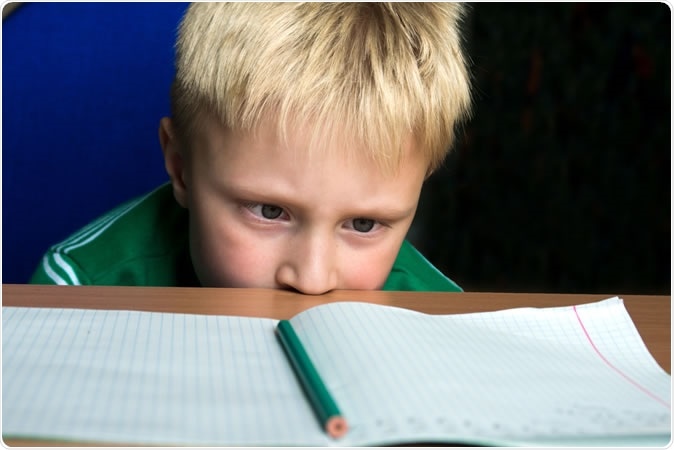The youngest children in any class at school are, on average, at a 40% higher risk of being diagnosed with Attention Deficit Hyperactivity Disorder (ADHD), and a 30% increased risk of depression or intellectual disability compared to the oldest, says a new study published on September 23, 2019 in JAMA Pediatrics.

Image Credit: Oksana Mizina / Shutterstock
The study, which covered a million children, points out that depression is still rare in childhood, but is intended to help researchers understand the causes.
There are about 800,000 children in UK primary schools. The data for the current study was retrieved from the Clinical Practice Research Datalink, which is a large database of primary care electronic records. The data on children aged 4-15 years in a given school year was used to classify then into four groups by age. The GP records showing a diagnosis of ADHD, depression, or intellectual disability were then searched for and compared between these groups. Factors such as the calendar year, the socioeconomic status and the sex were compensated for in the analysis
What were the study outcomes?
According to this study, 500 more children born in the last quartile of the school year would be diagnosed with these conditions over their entire school life (up to the age of 16 years), compared to those born in the first quartile. In absolute terms, this correlates with 2,200 vs 1,700 children in the youngest and oldest age brackets in any class. This research thus points in the same direction as older studies: about 4,700 and 2,100 of the youngest quartile are at risk for diagnoses of ADHD and learning disability respectively, vs 3,500 and 1,600 for the oldest quartile.
The study showed that irrespective of sex, children were negatively affected by being the youngest in the class, but the occurrence of ADHD was more frequent in the under-10 group, especially when the first and the fourth quartiles were compared in any given year.
Researcher Jeremy Brown says, “Children who are young in their school year are more likely to have hyperactivity disorders and tend to do less well academically than older children. However, we believe this is the first evidence of an association between younger relative age in the school year and increases in the diagnosis of depression.”
The study did not focus on the reasons for this disparity. However, it does bring to light the fact that the ages of the youngest and oldest children in the same grade at school may be separated by almost one whole year apart. This could make it difficult for the youngest children to cope with the routine and demands of the school system as well as the youngest, for instance, in terms of sitting still or their concentration on a given task. If unnatural comparisons are made, this could well lead to the youngest quartile of children being labeled or diagnosed hyperactive or slow learners. They may also find it harder to get on with other children since they are almost a year behind in their development. The combination of many such factors could well encourage the growth of depression and other mental health issues.
What can be done?
This issue affects relatively few children. Researcher Ian Douglas points out that not only are more people within the education system becoming aware of mental health issues in the school stream, but also depression will be diagnosed in only 1 in a hundred of the youngest children by the time they turn 16.
Many social scientists have come up with plans to address this issue, such as delaying school admission for a year for children who are at the very end of the eligible age limit. However, few studies have been done to examine how well these interventions work. An important focus for future work is seeing whether the depression or mental health issues due at least in part to this age disparity extends into adult life.
Douglas also recommends that school staff be aware of this potential problem, avail of support from the NHS Child and Adolescent Mental Health Services, as well as within the school itself. Parents of very young children who do not seem quite at par with the older children in the same class should also find it easy to choose to defer their child’s admission for a year, with the support and understanding of the local school authorities.
Journal reference:
Association of relative age in the school year with diagnosis of intellectual disability, attention-deficit/hyperactivity disorder, and depression. Adrian Root, Jeremy P. Brown, Harriet J. Forbes, Krishnan Bhaskaran, Joseph Hayes, Liam Smeeth, & Ian J. Douglas. JAMA Pediatrics. September 23, 2019. DOI:10.1001/jamapediatrics.2019.3194. https://jamanetwork.com/journals/jamapediatrics/fullarticle/2751331